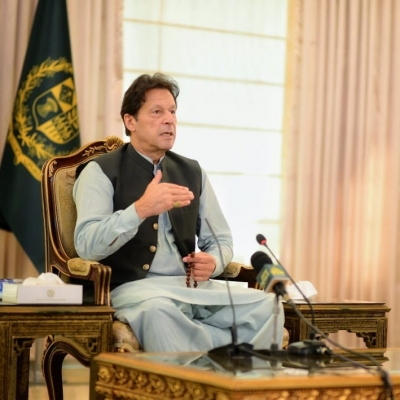Pakistani establishment appears to have realised that in case the Taliban captured Afghanistan by force, there can be a serious blowback against Islamabad, which it can ill-afford.
Pakistan’s Prime Minister apprehends that the establishment’s control over the Taliban is slipping. And this was evident when he stated that Pakistan is pushing hard for a political settlement in Afghanistan before foreign troops leave later this year, in order to avoid a Civil War across the Durand line.
Pentagon officials have said that one fourth of the US withdrawal, slated to be completed by September 11, has already been accomplished. The US forces have already handed over some bases to Afghan forces, including the New Kabul Compound, known as NKC, in Kabul.
“There is a lot of fear right now in Pakistan and I assure you that we are trying our level best that there is some sort of political settlement before the Americans leave,” Khan told Reuters in an interview in Islamabad. “Since the moment the Americans gave a date, of when they were going to leave Afghanistan … the Taliban feel they have won the war,” Khan said, adding it was not going to be easy to get concessions from the Taliban once the US had made its withdrawal decision.
Also read: Pakistan seeks Afghan settlement before foreign troop pullout: Khan
Fighting has intensified in Afghanistan since the US and NATO began withdrawing their forces. Nearly 1,800 Afghan civilians were killed or wounded in clashes in the first three months of 2021, according to the United Nations. That's a 29% increase compared to the same period last year.
Khan said Pakistan would suffer the most, after Afghanistan, if there was civil war and a refugee crisis erupted. “And then there would be pressure on us to jump in and become a part of it,” he said, adding that his government has changed Pakistan’s decades-long policy of pushing for ‘strategic depth’ in Afghanistan to ensure that there was a friendly government there. “Any Afghan government chosen by the people is who Pakistan should deal with,” he said, adding that Pakistan ‘should not try to do any manipulation in Afghanistan,’ a veiled reference to the Pak military establishment.
Yet it is evident that the Afghan government deeply distrusts Pakistan. Unsurprisingly, Afghan President Ashraf Ghani has on various occasions asserted that it’s time that Pakistan chose its path when it comes to its relations with Afghanistan. He has stressed that the Taliban receives support from Pakistan and its finances as well as recruitment is controlled from there. The names of the various decision-making bodies of the Taliban are Quetta Shura, Miramshah Shura and Peshawar Shura – named after some of Pakistan’s major cities.
Reacting sharply to Ghani’s observations, Pakistan Foreign Minister Shah Mahmood Qureshi has shot back by saying that there are people within Afghanistan who want to disrupt the peace process in the country. But the Afghan government claims that Pakistan’s failure to live up to its promises of containing the Taliban has contributed to the unending cycle of violence in Afghanistan.
Also read: It is a country I love, and I will die defending says Afghan President Ghani
While Pakistan has been taking credit for facilitating the US-Taliban Doha Agreement last year, it has, of late, realised that it cannot trust the Taliban in future. Pakistan also worried about the re-emergence of the militant organisation the Tehreek-e-Taliban also known as Pakistani Taliban, which poses a threat in Pakistan and beyond.
There is also Chinese pressure on Pakistan, not to bond deeply with the Taliban. On June 3, Pakistan, China and Afghanistan in a trilateral meeting, opposed any attempt to impose a government in Afghanistan, in an apparent reference to growing concerns that the Taliban are trying to take control of the country in the wake of withdrawal of foreign forces.
While international pressure on Pakistan to get the Taliban back on the negotiating table grows, the Chinese side is wary of the Taliban coming to power. In May the Chinese foreign minister Wang Yi had said China hoped to see a “moderate Muslim” leadership in Afghanistan in the future and has assured the country of help in strengthening its anti-terrorism capacities. China fears that a radicalised Afghanistan can become both a sanctuary and a springboard for launching Uyghur insurgents into the mainland across the Wakhan corridor.
Also read: China and India’s interests do not clash in Afghanistan-Afghan envoy




















